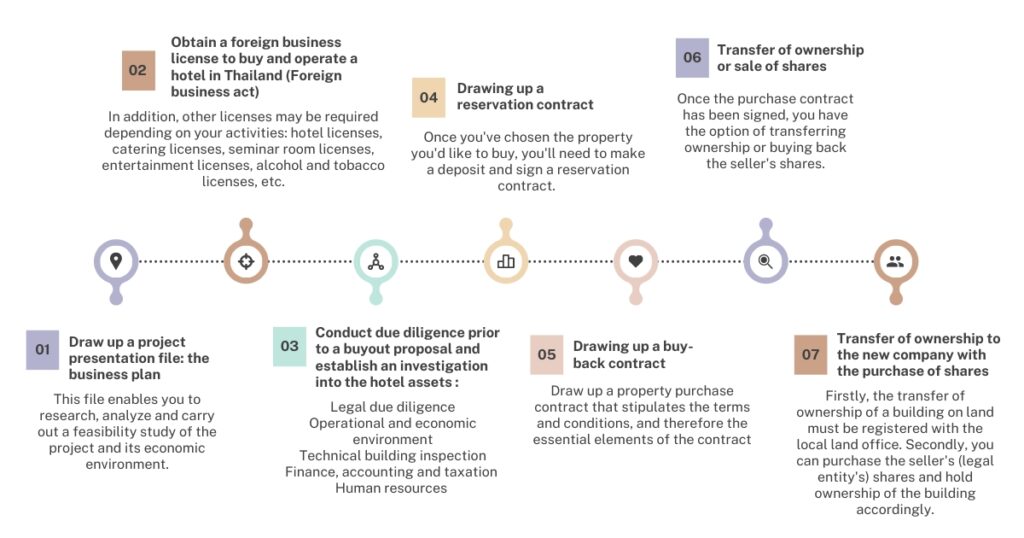Call us now:

Buying a hotel in Thailand
Beyond Thailand’s worldwide renown as a tourist paradise, the country also invites opportunistic investors seeking both professional gratification and financial prosperity in the burgeoning sector. To buy a hotel in Thailand comes with the promise of personal enrichment on a grand southeast Asian odyssey, as well as a shrewd long term play in a market primed for exponential expansion.
Thailand’s hotel sector was decimated by the pandemic, with half of all properties shuttering amid renewed outbreaks. Many owners were left with no choice but to offload their establishments in firesales, while some declared bankruptcy altogether. Recognizing tourism as a pillar of its economy, the Thai government took swift action to stabilize the foundering hospitality industry with emergency cash injections.
Table of Contents
What varieties of hotel are available in Thailand ?
Thailand offers diverse accommodations to suit all travelers, including:
- Type 1 : Lodgings are exempt from some regulations, requiring no hotel license. Rooms may be quite compact.
- Type 2 : Inns provide only rooms for resting, with 50 rooms or less no smaller than 8 square meters each. Simple but sufficient for a good night’s sleep.
- Type 3 : Hotels go a step further with dining in addition to quarters. Still quite basic but with nourishment as well.
- Type 4 : Resorts give guests more amenities with entertainment and meeting spaces that can host social gatherings. Larger 14 square meter rooms make them feel quite lavish in comparison.
- Type 5 : Properties are full service destinations with everything under one roof, from slumber to supper to symposiums. All indulgences are within reach for travelers seeking complete relaxation and replenishment
What options exist for foreigners in Thailand ?
Full ownership by non-Thais is forbidden, yet workable alternatives are available. Individual foreigners cannot invest in hotels directly; they are restricted to condominium acquisitions in principle. An individual’s sole option is purchasing a villa for residing while renting the underlying land in perpetuity.
Potential ownership through a Thai corporation remains feasible. Foreign companies can form joint ventures with domestic partners or limited liability companies under the Foreign Business Act. Upon procuring a license from the Department of Business Development, firms may operate profitably with 49% foreign ownership and implicit management through a lawyer’s voting system. Consequently, a corporation permits outright land ownership.
One solution entails a long-term land lease renewable once for 30 additional years, allowing full property control for a maximum sixty years as prescribed by Thailand’s Civil and Commercial Code. In practice however, contracts can extend the lease to ninety years total through pairing two supplementary 30-year agreements whereby the lessor further commits to future renewals. In summary, various lawful pathways circumvent outright foreign ownership while affording hotel acquisition and operation in Thailand.
What are the steps involved in purchasing a hotel in Thailand ?

What are the steps involved in obtaining a license ?
Before selecting a location to buy a hotel in Thailand, ensure the chosen building’s permit sanctions usage as a hotel according to construction regulations. Once obtaining building authorization for hotel function, initiate a license application to the local Administrative Department if in Bangkok, otherwise to the provincial governor’s office. Submit an additional petition to the provincial authority, which forwards to health, environmental and building inspection divisions.
The assessors will thoroughly check and verify the structure for compliance. Provided no objections arise and inspectors find satisfaction after evaluation, the license shall be granted. Approximately a half year is typical for complete processing. Finally, the five-year hotel approval, renewable, will be in effect.
Varied in complexity were the sentences describing the involved steps to acquire a hotel license. Foremost, validating the chosen building’s permitted usage preceded selecting a site for the hotel project. Next, gaining construction consent for hotel operation allowed initiating the licensing petition. An additional application to the local administrative department stimulated examinations by relevant assessors. Provided thorough investigation revealed no issues and inspectors felt contentment with the structure’s conformity, approval would be conferred. Around six months often encompassed the full procedure’s duration. In closing, a renewable five-year hotel license would be in authorized effect.
